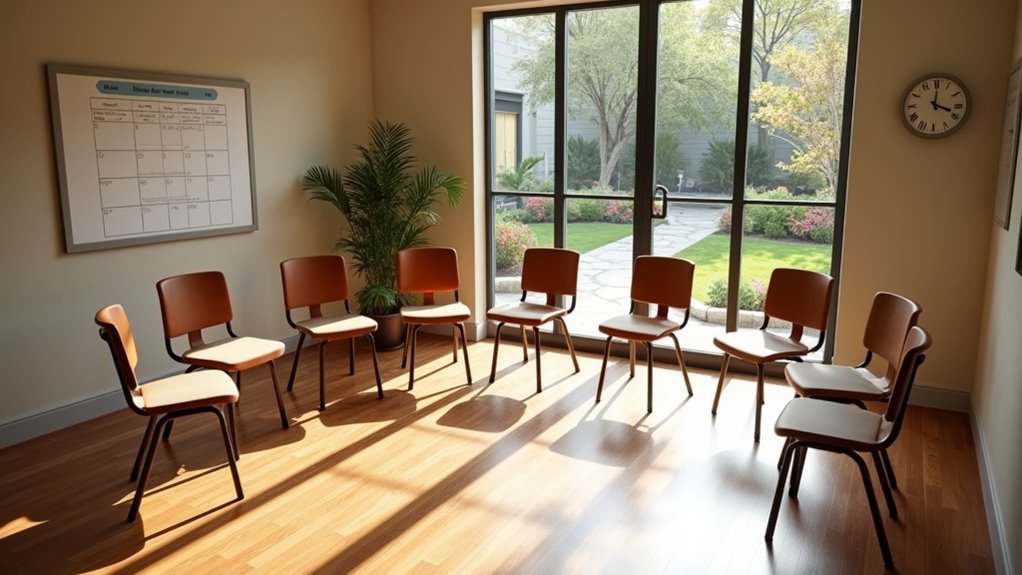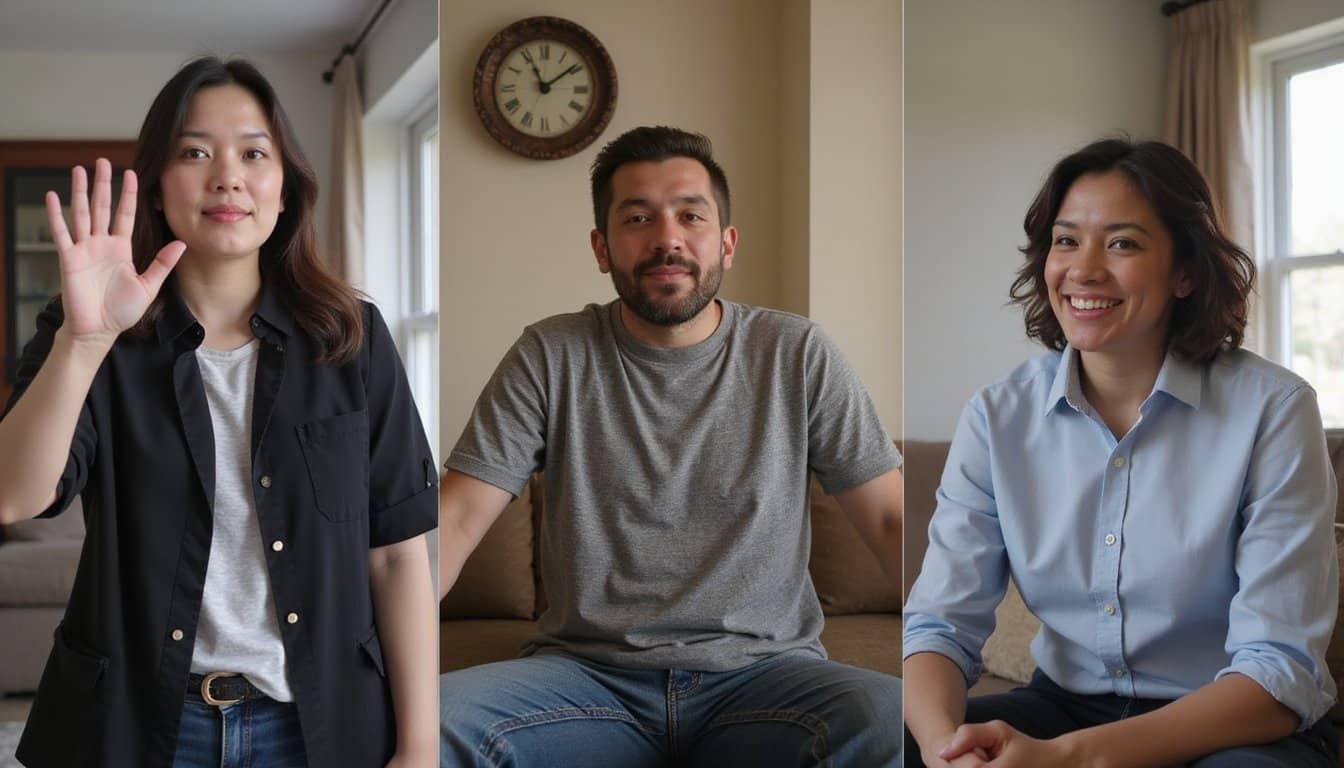Outpatient addiction treatment lets you maintain your daily responsibilities while receiving structured care through regular therapy sessions. You’ll typically attend 3 sessions per week, totaling 9-12 hours, which include individual counseling, group therapy, and medical monitoring. Your personalized treatment plan combines evidence-based approaches, medication management if needed, and support services to address your unique recovery needs. By working with professionals and peers, you’ll develop essential coping skills and strategies for long-term success. The path ahead offers proven pathways to lasting recovery.
The Basics of Outpatient Treatment Programs

While addiction recovery takes many forms, outpatient treatment programs offer a flexible yet structured approach that lets you maintain your daily responsibilities during treatment.
You’ll typically attend sessions 3 times per week, with programs offering morning or evening hours to accommodate your schedule. These sessions usually run between 9-12 hours weekly, striking a balance between intensive care and daily life integration. Sessions incorporate psychoeducational support services to enhance your understanding of addiction and recovery.
The outpatient effectiveness stems from combining different therapeutic approaches customized to your specific needs. You’ll benefit from continuing care services that provide ongoing support and monitoring to help prevent relapse.
You’ll participate in individual counseling, group therapy, and skill-building workshops that address your unique recovery challenges. Programs can extend beyond 90 days, adapting to your progress and relapse risk.
Through evidence-based treatments like CBT and the Matrix Model, you’ll develop practical tools for managing triggers while maintaining your work, school, or family commitments.
Key Components of Non-Residential Care

Because successful addiction recovery requires a thorough approach, non-residential care combines several essential components to support your path to sobriety.
Your personalized treatment plan will integrate evidence-based therapies, counseling, and support networks to address your unique needs and circumstances. The center’s multidisciplinary team creates comprehensive treatment strategies tailored to each individual’s recovery journey.
A comprehensive treatment strategy combines proven therapeutic methods and counseling support, tailored specifically to your individual recovery journey.
- You’ll work with professionals to develop customized strategies, including medication management, behavioral therapy, and psychosocial interventions that target your specific challenges.
- Your relapse prevention plan will identify triggers and establish practical coping mechanisms while building a strong support system through family counseling and peer groups.
- You’ll participate in ongoing monitoring and assessments, ensuring your treatment plan evolves as you progress through recovery, with adjustments made to maintain your success in achieving sobriety.
Daily Structure and Treatment Schedules

Your outpatient addiction treatment will include carefully scheduled individual therapy, group sessions, and complementary treatments that work around your daily responsibilities.
Establishing consistent treatment times helps create positive daily habits that minimize relapse risks and support lasting recovery.
You’ll participate in a mix of morning, afternoon, or evening appointments for counseling and peer support meetings, with options to adjust timing based on work or family commitments.
Through consistent attendance and engagement in these structured sessions, you’ll develop healthy routines that support your recovery while maintaining your regular life activities. A typical day may include participation in behavioral health groups where you’ll learn alongside peers facing similar challenges.
Treatment plans are customized to address your unique needs, ensuring you receive comprehensive care that encompasses medical, psychological, and social support services.
Session Types and Timing
Since successful addiction recovery depends heavily on structured routines, outpatient treatment programs organize their sessions into distinct categories with specific timing throughout the day.
You’ll find that session frequency and therapy duration vary based on your individual needs and progress in recovery. Most programs combine core therapeutic interventions with complementary activities to support your healing process.
- Core therapy sessions typically occur during morning or early afternoon hours, including individual counseling, group therapy, and CBT-based interventions.
- Complementary therapies like art, music, or movement sessions are often scheduled mid-day to provide creative outlets and stress relief.
- Support groups and skill-building workshops usually take place in late afternoon or evening hours to accommodate work schedules and enhance participation.
Flexible Scheduling Options
When seeking outpatient addiction treatment, you’ll uncover flexible scheduling options that adapt to your daily life commitments. Programs typically require a minimum of 9 hours per week, with sessions ranging from 3-8 hours daily. You can choose from morning, evening, or weekend sessions to maintain your work or education responsibilities.
Your personalized treatment plan offers scheduling flexibility through part-time participation and modular scheduling. As you progress, your session frequency may decrease, reflecting your growing stability and changing needs.
You’ll engage in a mix of individual counseling, group therapy, and complementary activities like art or music therapy. If you experience challenges, your schedule can be adjusted to provide further support. This adaptable approach guarantees you receive consistent care while managing your daily responsibilities.
Building Daily Recovery Routines
Building a structured daily routine serves as the cornerstone of successful outpatient addiction recovery. When you establish consistent recovery habits, you’ll replace chaotic patterns with predictable activities that support your sobriety. Research shows it takes approximately 66 days to establish new behavioral patterns that feel natural. Balance and flexibility in your routine helps prevent feelings of being overwhelmed or restricted.
Your routine flexibility allows you to maintain work and family commitments while prioritizing treatment activities. Participating in creative therapy sessions can provide additional emotional outlets while maintaining your daily responsibilities.
Key elements of your daily structure should include:
- Regular therapy sessions and support group meetings to reinforce accountability
- Scheduled self-care practices, including exercise, proper sleep, and healthy meals
- Stress management techniques and trigger-avoidance strategies
Medical Support and Monitoring Options
If you’re starting outpatient addiction treatment, you’ll have access to extensive medical support including medication-assisted recovery with options like buprenorphine or naltrexone, alongside daily health monitoring through regular check-ins with healthcare providers.
Your treatment team will establish personalized check protocols to track your crucial signs, withdrawal symptoms, and medication effectiveness through electronic health records and toxicology screenings. Cognitive behavioral therapy helps patients develop important coping strategies during outpatient treatment.
Should you experience any medical emergencies or relapse concerns, crisis management systems are in place with rapid-response protocols and immediate access to healthcare professionals who can adjust your treatment plan.
Medication Assisted Recovery Options
Medication Assisted Recovery (MAR) combines FDA-approved medications with evidence-based therapies to create an extensive treatment approach for substance use disorders.
Your treatment plan’s medication efficacy depends on personalized factors, including your substance use history and general health status. Through treatment personalization, you’ll receive carefully customized doses of medications like buprenorphine, methadone, or naltrexone to address your specific recovery needs. A thorough physician assessment is required before beginning any medication-assisted treatment program. MAR provides a compassionate environment for individuals seeking lasting recovery.
Key components of MAR include:
- Dual-action support that reduces cravings while blocking substance rewards
- Regular health monitoring to adjust medications and track your progress
- Integration with counseling and behavioral therapies to address psychological triggers
This thorough approach helps you focus on recovery by managing withdrawal symptoms and preventing relapse, while building essential coping skills through therapeutic support.
Daily Health Check Protocols
Regular health monitoring forms the cornerstone of your outpatient addiction treatment, combining essential sign tracking with detailed medical assessments to confirm your safety and progress.
During each visit, healthcare providers will check your crucial assessments, including blood pressure, heart rate, and withdrawal symptoms, to maintain your health status.
You’ll undergo routine screenings to track medication effectiveness and potential toxicity, while automated systems alert staff if any readings fall outside safe ranges.
Medical professionals will regularly evaluate your mental health through standardized screenings and monitor your substance use through periodic testing. They’ll also assess any co-occurring conditions that might affect your recovery.
This thorough monitoring confirms you’re receiving appropriate care while helping your treatment team make informed adjustments to your recovery plan when needed.
Crisis Management Systems
When you’re facing a crisis during addiction treatment, extensive support systems stand ready to help you maintain stability and safety. Crisis intervention strategies include 24/7 helplines, emergency medication access, and immediate telehealth services to provide rapid assessment and care.
The emergency response systems coordinate seamlessly between outpatient providers and crisis teams to guarantee you receive appropriate support. Studies show that timely crisis intervention increases treatment engagement by 30%.
Your crisis management plan includes:
- Immediate access to medical professionals who can provide emergency medications and essential sign monitoring
- Quick connection to behavioral health specialists for crisis-focused therapy and trauma support
- Real-time coordination with family members and support networks to stabilize your environment
These thorough systems work together to protect your recovery path, prevent relapse, and help you navigate challenging situations with professional guidance and support.
Group Vs Individual Therapy Approaches
Although both group and individual therapy play vital roles in outpatient addiction treatment, group therapy has emerged as the cornerstone of most recovery programs, with over 90% of facilities prioritizing this approach.
Through group dynamics, you’ll benefit from peer support, shared experiences, and collective problem-solving strategies that can improve your recovery rates by up to 50%. Most treatment programs recommend group sizes between 6 to 12 participants for optimal therapeutic benefits. Regular sessions incorporate structured activities to enhance coping skills and promote lasting recovery.
While group sessions focus on peer-driven strategies and communal learning, individual therapy addresses your unique challenges, including personal trauma or dual diagnoses. With 40.3 million people struggling with substance use disorders, the need for diverse treatment approaches has never been greater.
You’ll find that group therapy is more cost-effective and accessible, making it easier to maintain long-term participation.
Research shows that 70% of participants credit peer support as essential to their recovery, and group settings can reduce anxiety and depression symptoms by 60%.
The combination of both approaches offers you the most thorough support system.
Building a Strong Support Network
Building a strong support network serves as the foundation of successful outpatient addiction recovery, with research showing that patients who maintain solid support systems are three times more likely to achieve long-term sobriety.
Your network should integrate family involvement, peer support, and professional guidance through therapy dynamics that address your unique recovery needs. Regular participation in 12-step programs provides valuable guidance and shared experiences with others on similar recovery journeys. The quality of relationships in your support system directly influences positive treatment outcomes.
- Connect with multiple support channels, including family members, sober friends, and healthcare providers who’ll assist with both emotional and logistical aspects of your recovery.
- Engage actively in community resources like mutual aid groups, religious support systems, and online recovery forums that align with your personal values.
- Maintain open communication strategies with your support network while setting healthy boundaries and participating consistently in relapse prevention activities.
Navigating Work and Treatment Balance
Maintaining a successful balance between work commitments and addiction treatment requires strategic planning and flexibility, with research showing that integrated approaches yield higher recovery success rates.
You’ll find that flexible scheduling options, including part-time participation and telehealth services, can help you maintain employment while pursuing recovery. Research indicates that comprehensive treatment plans lead to improved outcomes in drug use reduction, criminal activity, and social functioning. Support systems play a vital role in workplace recovery success.
Workplace incentives play an essential role in supporting your sobriety, with studies showing 82.7% success rates in abstinence-contingent employment programs.
You can benefit from therapeutic workplaces that combine job training with treatment, while stress management strategies and mindfulness training strengthen your relapse prevention skills.
Consider taking advantage of weekend or evening programs that accommodate your work schedule, and keep in mind that many employers now offer wellness programs to support your recovery path while maintaining professional productivity.
Progress Tracking and Recovery Milestones
Tracking your progress in addiction recovery provides essential insights through thorough monitoring systems and evidence-based metrics. Progress monitoring tools measure your abstinence rates, mental health improvements, and treatment adherence while helping clinicians make informed decisions about your care.
Digital platforms and self-reporting systems empower you to actively participate in your recovery expedition.
Key recovery milestones you’ll track include:
- Sustained abstinence periods and reduced cravings through standardized assessment tools
- Improvements in mental health symptoms like depression and anxiety via weekly rating scales
- Treatment engagement metrics, including attendance rates and participation in therapy sessions
Your healthcare team uses this data to adjust your treatment plan, evaluate medication effectiveness, and guarantee you’re receiving the most beneficial level of care for your ongoing recovery needs.
Transitioning Through Different Care Levels
As you progress through addiction recovery, you’ll encounter diverse levels of care designed to match your evolving treatment needs. Care level changes are based on standardized ASAM criteria and ongoing clinical assessments to guarantee you receive appropriate therapy intensity at each stage.
You might start with medical stabilization or detox before moving to outpatient services, which range from standard programs (≤9 hours weekly) to more intensive options like IOP (9-20 hours) or PHP (20+ hours).
If you need more support, residential or inpatient care is available. Your path may include stepping up or down through these levels based on your progress and needs.
Treatment duration varies individually, with outpatient services offering flexible, long-term support while higher-intensity programs typically follow more structured timeframes.
Many facilities integrate multiple service levels to guarantee smoother changes throughout your recovery.
Frequently Asked Questions
How Long Does It Typically Take to Complete an Outpatient Treatment Program?
While standard outpatient programs typically last 28 days, your specific duration will depend on multiple factors, including addiction severity and personal circumstances.
Treatment flexibility allows programs to range from 2-4 weeks for mild cases to 3-6 months for more complex situations.
You’ll find that longer engagement often leads to better outcomes, with research showing that 90-day participation provides the highest success rates for sustained recovery.
What Happens if I Relapse During Outpatient Treatment?
If you relapse during treatment, don’t panic it’s a common part of recovery that many people face.
Your treatment team will work with you to understand what triggered the relapse and adjust your plan accordingly. They’ll likely increase your support through supplementary counseling sessions and strengthen your coping strategies.
Remember, relapse consequences don’t mean failure; they’re opportunities to identify vulnerabilities and build stronger recovery skills.
You’re not alone in this process.
Can Family Members Participate in My Outpatient Treatment Sessions?
Yes, you can absolutely involve your family in your treatment process.
Most outpatient programs encourage family involvement through different support systems, including family therapy sessions, educational workshops, and multi-family support groups.
Your loved ones can learn about addiction, develop better communication skills, and understand how to support your recovery effectively.
This participation typically strengthens your support network and can greatly improve your chances of long-term success in recovery.
Are Outpatient Treatment Programs Covered by Most Insurance Plans?
Yes, most insurance plans provide coverage for outpatient addiction treatment, though specific benefits vary.
You’ll find that over 10,000 treatment centers across the U.S. accept insurance.
To understand your treatment costs, it’s essential to verify your coverage details, including copays, deductibles, and network requirements.
If you’re using Medicaid, be aware that coverage may be more limited for certain medications and services compared to private insurance plans.
What Criteria Determine if Someone Qualifies for Outpatient Versus Inpatient Care?
You’ll qualify for outpatient treatment if you have a mild to moderate substance use disorder, stable housing, and a strong support network.
Outpatient criteria include your ability to manage daily responsibilities while seeking treatment and no severe withdrawal symptoms.
However, if you need 24-hour medical supervision, have severe withdrawal symptoms, or lack a safe living environment, inpatient criteria suggest you’d benefit more from residential care for initial stabilization.






